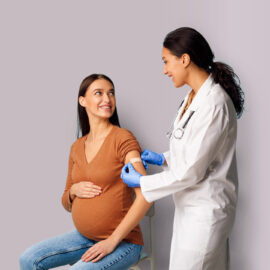About
Vaccinating pregnant women against influenza gives a 3 for 1 benefit:
- protects the woman during pregnancy and in the early months of motherhood
- protects the young infant by trans-placental antibodies
- protects the young infant by antibodies in breast milk.
How serious is influenza for pregnant women?
Influenza can be very serious in pregnant women and their newborn babies.
Changes in the immune system, heart and lungs during pregnancy make pregnant women more likely to suffer complications from the flu than women of childbearing age who are not pregnant. Influenza can cause life threatening illnesses like pneumonia1 and damage to the heart, brain and other parts of the body. These complications can lead to hospitalisation and even death.
Influenza can also cause premature labour, stillbirth and low birth weight. Young babies may also develop pneumonia and die. Babies less than six months are more likely to be hospitalised than any other age group.
1 Pneumonia: an infection of the lungs where the air sacs get inflamed and filled with pus.
How can you reduce the risk of catching influenza while pregnant?
The best way to reduce the risk of developing influenza during pregnancy is for pregnant women to get vaccinated.
The flu shot is free for pregnant women.
Other preventative measures which are suggested for everyone are avoiding people who are sick, covering coughs and washing hands often.
When should you get vaccinated?
The influenza vaccine can be given at any stage during pregnancy. It is best given before the influenza season starts but it can be given at any time during the year and it will still provide some protection to the mother and baby when it is born.
Women who were vaccinated before becoming pregnant should be re-vaccinated during pregnancy to protect the baby.
Will the baby be protected?
By getting vaccinated, you pass on protective antibodies2 through the placenta to your baby which will protect your infant in the first six months of life.
Vaccination during pregnancy is estimated to reduce the risk of influenza in babies aged less than 6 months by about half.
Babies cannot be vaccinated against influenza until they are six months of age so they rely on maternal vaccination for protection in the first six months of life.
Vaccinating household contacts who will be in close contact with the baby will also help to reduce the transmission of the virus to the baby.
2 Antibodies: protective proteins produced by the immune system to protect your body against infection.
How safe is the influenza vaccine during pregnancy?
Flu shots have been given to millions of pregnant women over the years with an excellent safety record.
Many large studies have shown no evidence of harmful birth outcomes like birth abnormalities, stillbirth or low birth weight.
Injection site reactions and fever do not occur more frequently in pregnant than non-pregnant women.
References:
- Australian Technical Advisory Group on Immunisation (ATAGI). Australian Immunisation Handbook, Australian Government Department of Health, Canberra, 2018, immunisationhandbook.health.gov.au
- Centers for Disease Control and Prevention (CDC) Seasonal Influenza: Who is at higher risk of Flu Complications: Flu and Pregnancy last reviewed 2 September 2021
- National Centre for Immunisation Research and Surveillance (NCIRS) Influenza vaccines for Australians Fact Sheet June 2021
